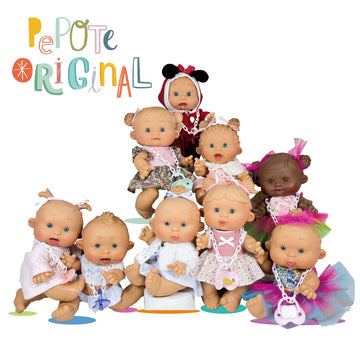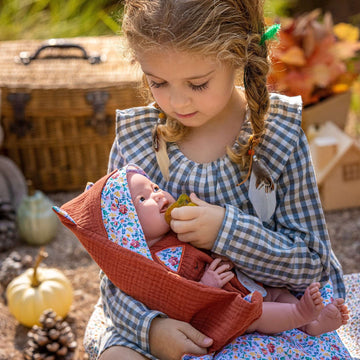Indicators on Dolls And Accessories You Should Know
All about Dolls And Accessories
Table of ContentsThe Best Guide To Dolls And AccessoriesThe Facts About Dolls And Accessories UncoveredThe 3-Minute Rule for Dolls And AccessoriesWhat Does Dolls And Accessories Do?The smart Trick of Dolls And Accessories That Nobody is DiscussingFascination About Dolls And AccessoriesIndicators on Dolls And Accessories You Need To Know
When dolls are included in team play, youngsters practice waiting, sharing, and listening to others' concepts. Whether they're making believe to be a moms and dad, brother or sister, or pal, children learn how connections workhow to support others, solve disputes, and take care of another person. These very early role-play experiences become the foundation for healthy and balanced relationships and partnerships later in life.Repeating calming routines with a doll (feeding, shaking, placing to bed) can aid children feel tranquil and safe and secure. Taking treatment of a doll can make a kid feel qualified and certain.
Unknown Facts About Dolls And Accessories
When kids see dolls that reflect their race, heritage, and culture, it reinforces a positive feeling of identity. It says, "You belong. Your tale issues." Dolls also introduce children to cultures outside their own, developing respectful curiosity and empathy for others. This is where inclusive play can cause comprehensive communities.
As Dr. Karyn Purvis, a leader in kid growth and trauma-informed treatment, once said: This powerful quote highlights how play isn't just funit's just how youngsters learn best. The mind cables itself via repetition. However when a youngster is involved, joyful, and emotionally connected to an activitylike doll playthe brain strengthens those connections faster and much more meaningfully.
The Ultimate Guide To Dolls And Accessories

Young boys require compassion, compassion, and imagination tooand doll play provides that. Yesdolls use something distinct. They motivate flexible narration and psychological link in a manner few other playthings do. Dolls are usually a child's first "pal," assisting them practice connections, construct communication skills, and feel comforted. Kids create their sense of self from a young age.
6 Simple Techniques For Dolls And Accessories
Through play. Through satisfaction. Through dolls that matter. Thanks for joining us on this journey. Samantha Ong Samantha Ong is the owner of Joeydolls, a Canadian-based plaything brand name on an objective to celebrate Asian societies through cheerful, comprehensive play. Inspired by her very own experiences maturing without cultural depiction, Samantha designs dolls that assist youngsters really feel happy with that they are while triggering interest and empathy in others.
Playing with dolls motivates children to speak even more regarding others' ideas and feelings, a study has found. The research study suggests that playing imaginary games with dolls might assist kids create social abilities, theory of mind and empathy.
The Buzz on Dolls And Accessories
They were additionally most likely to resolve the dolls in the second person, talking with them directly, whereas the personalities on the computer system screen they often tended to refer to in the 3rd person. No distinction was observed between children and ladies."Interior state language can indicate that a kid is thinking of other individuals's thoughts and feelings while playing with dolls," said Gerson.
And that they see language usage in this respect is great verification of the hypothesis."Mardell added that the findings ought to use to any kind of kind of role-play plaything, rather than being details to Barbies."Children generally begin to reveal indicators of interior state language around the age of 4.
Little Known Facts About Dolls And Accessories.
"It becomes important for making and maintaining relationships, and how they gain from their instructors, and parents."The study additionally found that the youngsters had actually increased mind activity in the posterior remarkable temporal sulcus (pSTS) region when they spoke as though their dolls had thoughts and feelings. The pSTS area is thought to be associated with the growth of social and psychological handling abilities.
Childhood years is not a static life phase; undoubtedly, the meaning, significance and understanding of youth are all subject to modification. By the nineteenth century one of one of the most profound changes was the significance positioned on permitting kids to experience "the carefree delights" of childhood years through playtime activities. Play was now thought about to be a crucial element of a good childhood.
In order to fully comprehend the definition of play, one have to likewise understand the importance of the doll. Nonetheless, dolls are a lot more than toys created to amuse girls. During the nineteenth century correct playtime activities were picked to promote intellectual, physical or psychological advancement. Dolls were especially popular since they were believed to foster and nurture womanly high qualities such as kindness, caring and concern.
The Facts About Dolls And Accessories Uncovered

It is only with archaeological investigations that researchers can intend to reveal and record the full variety of play experiences. Narrating these experiences, and specifically the duty of dolls, is important for providing a much more total image of youth during the discover here 19th century. Alarcn, Sara E - high end dolls., "Youngster's Play: The Duty of Dolls in 19th Century Youth" (2007 )